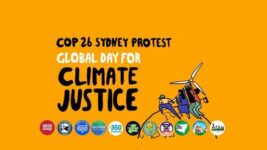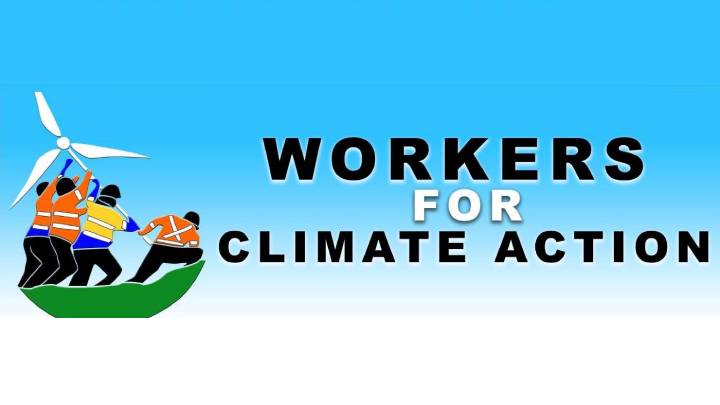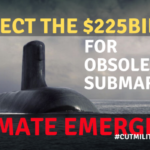Climate Action, Not Global Cop Out: An Interview With Workers for Climate Action’s Caitlin Doyle-Markwick

Scott Morrison just addressed the COP26 in Glasgow. And true to form, the PM blew unintelligible hot air at the crowd attending “the last chance saloon” for climate action, as he ticked the required seen-to-be-doing-something box and maintained business as usual for the local fossil fuel industry.
“Technology will have the answers to a decarbonised economy, particularly over time,” Morrison told the annual UN climate conference, “and achieve it in a way that does not deny our citizens, especially in developing economies, their livelihoods or the opportunity for a better quality of life.”
This rhetoric is more of the same from the so-called leader of the nation. His vision is that the fossil fuel industry should just chug along as usual and, hopefully, that same industry will be able to invent new technologies that will reverse the change in climate it is causing later down the track.
The PM implied that pre-existing clean energy alternatives, like wind and solar, are expensive, despite renewables already being the cheaper option. And he tosses around his favoured technology – fossil fuel company-driven carbon capture and storage – as if it hasn’t already been a giant failure.
Code red for humanity
The latest IPCC report made clear that the Paris COP21 goal of keeping below a 1.5 °C temperature rise on preindustrial levels is quickly becoming unobtainable. While UN secretary general António Guterres told COP26 on Monday that the globe is currently tracking towards a “calamitous 2.7° rise”.
The effects of climate change are already upon us. During the 2019-20 prolonged and unprecedented Australian bushfire season, 20 percent of mainland forest burnt to the ground. While this year’s northern summer saw multiple climate catastrophes across that entire hemisphere.
And in the midst of all of this, Australia has become a – if not the – chief climate culprit. This country was ranked worst amongst the globe’s largest economies in terms of taking climate action. And we’re positioned as the 11th highest CO2 emitting nation on a per capita basis out of 209 countries.
Yet, the PM still had the gall to release The Plan to Deliver Net Zero: The Australian Way a week out from the COP. This is a document that contains no plan but asserts the nation will proactively address climate via the use of dodgy techniques, as well as technology that’s yet to be invented.
Publicly owned renewables
The COP26 Sydney Protest is being held this Saturday as part of a global day of action, calling on world leaders to adequately deal with the crisis, instead of rolling out net zero policies that fail to address the seriousness of the circumstances we are now in.
Workers for Climate Action is one of 15 local civil society groups organising the Sydney rally. Established in 2019, the group is prioritising the need for the transition to renewable energy to be a 100 percent publicly owned venture, so it doesn’t involve the whim of the profit-driven marketplace.
Sydney Criminal Lawyers spoke to Workers for Climate Action spokesperson Caitlin Doyle-Markwick about July being the hottest month ever recorded, the flaws with Morrison’s “technology-driven plan”, and how there’s still time to save the planet’s weather systems if action is taken now.

After much toing and froing over whether he was going to even turn up to the event, Scott Morrison is now over in Glasgow for the COP26. Before he left, the PM released The Plan to Deliver Net Zero: The Australian Way.
A lot of commentators have suggested the document he did produce is not a plan at all. Caitlin, what are your thoughts on what the Morrison government has reluctantly come to the table with?
The net zero 2050 target is the absolute bare minimum for even attending COP26. It’s clear that the Morrison administration is feeling the pressure internationally, as it becomes an international climate pariah, as well as the pressure at home.
Morrison is caught in a bind. During the 2019 election, he hitched his political wagon to continuing to support fossil fuels. He took advantage of genuine fears amongst ordinary people about jobs, the cost of living and the future of fossil fuel communities.
Although, I don’t think he genuinely cares about these people, considering the way he treats workers and public services in these regions.
He’s politically committed to continue to support fossil fuels, but the reality is fossil fuels – and coal, in particular – is a dying industry.
The reality is renewable energy has become a lot cheaper, and it’s on the rise in terms of delivering energy all over the country. And increasingly, people around Australia want action. The climate movement was building pre-pandemic, and we’re trying to rebuild now.
Morrison’s plan – if you can call it that – is full of fluff. He’s even said that a lot of it won’t be legally enforceable. The targets are vague and, crucially, there’s no commitment to further reductions by 2030, which other countries have.
And through all of this, he’s still pushing on with his absurd gas-fired recovery, as he lies about natural gas being some sort of low emissions transition fuel, while it’s actually very high in emissions of both carbon and methane.
There is nothing transitional or temporary about the infrastructure that’s going to come along with expanding the gas industry in Australia.
Essentially, it’s more of what we had before: delaying and obfuscating. But now he has a book that he can wave around in parliament, like he waved the piece of coal around a few years back.
So, he’s saying he has a plan, but, ultimately, it’s a lot more delaying and obfuscation.

The Morrison government’s “technology-driven plan” places a lot of emphasis on carbon capture and storage. Canberra’s claim that CCS technology will be a major cure for climate change have been widely derided.
What’s the position of Workers for Climate Action in this regard?
We agree with the derision around carbon capture and storage technology. Again, it’s really a way of storing and avoiding reining in emissions. It’s a way of allowing emissions to continue on for as long as possible.
It’s madness to base so much of our country’s climate policy on technology that’s unreliable. And a lot of the technology doesn’t even exist yet.
As much as the carbon capture and storage technology is problematic, so too is carbon trading and sequestration, which are also a large part of the government’s approach now.
This is why the Nationals, in particular, have been talking much more about the “net” part than the “zero” part.
It is also why the global COP26 protests have been calling for real zero, not net zero. It’s because a lot of it is based on tricky accounting methods, such as buying carbon credits.
Buying credits is based on all sorts of dubious schemes, like allowing a company to continue emitting carbon if it stops carbon being emitted elsewhere by preventing deforestation from going ahead, for example.
I heard it recently described by someone at the Australia Institute as similar to convincing someone to not drive a car to work who was never going to drive one in the first place.
There are a lot of dodgy things going on, not only in Australia, but in Europe. In particular, with the carbon trading markets, which we have to keep an eye on and be very sceptical of.
Carbon sequestration is the idea that we can suck carbon out of the air at the same rate that you are emitting it, which is based on a misunderstanding of the way the climate system works.
It’s not only with carbon capture. It’s with this idea that we can rely on the ecosystem to just suck the carbon back out of the air.
Fossil fuels and living ecosystems are two very different things, and the way carbon is stored is different. The idea that it’s just some kind of input and output, as on a spreadsheet, is not really reflective of how the climate system works.
Ultimately, it provides a massive get-out-of-gaol-free card for a lot of companies in Australia and elsewhere.
Australia has recently been assessed as the worst G20 country in terms of climate change mitigation. But have the other largest economies in the world turned up to COP26 with targets that will head off climate collapse?
Ultimately, no. But other countries do clearly have more ambitious targets than us. The US, the UK and Japan do – hence all the pressure on Morrison.
But few of these other countries go far enough, and a lot of them are based on carbon trading and so on.
The IPCC puts together a gap report every five years. The latest one shows that the world’s combined targets – and the reality that very few countries are actually sticking to their own plans – sees us on track to far exceed the limit of 1.5°C heating that was set at the Paris talks.
That being said, this can’t be an excuse for the Morrison government to use as a way of getting out of things.
Australia has one of the highest emissions per capita in the world. And we also have the wealth to transform our energy system and economy, even with enough to spare to help poorer countries in our region – if there was the political will to do so.
As far as the climate movement is concerned, we can only make an impact here in Australia and hope that – like many other mass movements – it can have a ripple effect around the world.
There needs to be mass climate movements of the kind we’re trying to build here in all the major economies.
We want to see it happening in China, India and the US. But for us, our task is to build up the pressure on the Morrison government, and not allow him to use an excuse like other countries aren’t moving fast enough so then neither should we.
There is a bit of a game of chicken going on, and the buck has to stop somewhere.
You’ve just mentioned the latest IPCC report, which has been described as a “code red for humanity”. In your understanding, just how dire is the climate emergency at present?
You only need to look at the last two or three years to see just how bad it is. This is most obvious with the fires of Black Summer a couple of years ago.
And this year, July was the hottest month since records began. Globally, there was flooding in China, Germany and Belgium. There were wildfires in Greece and Algeria.
Those events are becoming more extreme and erratic: not only is it a matter of things getting hotter and hotter.
Most of the science says that global heating doesn’t just move in a straight line. So, what were once broadly predictable weather patterns are increasingly unpredictable and erratic.
Of course, we’ve always had natural disasters of one kind or another. But they’re obviously becoming more extreme, unpredictable and they’re outstripping the mechanisms and services that we have in place to deal with them.
In short, it’s pretty dire. But I do genuinely believe that we can turn things back, otherwise I wouldn’t be involved in the activity around climate.
You say that things could be turned back, so how could we be better approaching the climate crisis?
In terms of climate action, our focus has been on a couple of things. One of our main issues is around public-run and owned renewables.
The climate crisis is moving at such a pace that it really can’t be left up to the market. Even with renewables on the rise, it’s happening too slow and a lot of it is dictated by profit.
You have solar farms being set up without much regulation for working conditions. So, you can see why people might look at these industries and think that you don’t want to work under those conditions.
There is a problem with the approach to dealing with climate change being dictated by profit, rather than the needs of the community and ordinary people.
That’s why we’ve been calling for publicly run and owned renewables to be built. All of the coal-fired power stations that we have around Australia were actually built with public money.
They were publicly built projects, and we could do that again. That’s particularly if you look at the billions of dollars that are still going into fossil fuels, and now, also nuclear submarines.
Another main focus is climate jobs. We want to break down this idea that dealing with the climate crisis or climate action is at odds with jobs and the living standards of ordinary people.
In dealing with the climate crisis, we can create thousands of jobs, and not only in energy. Quite a few reports have come out about just how many jobs would be created in energy, in particular, offshore wind, but also in other things like transport and manufacturing.
If we expand our idea of climate jobs, it could also include an expansion of the public service in general. There could be more jobs in education and expansion of the public health system. These are sorely needed. There could be land regeneration jobs as well.
One of the goals is to make it very clear that job creation is something that could come out of dealing with climate.
We have to make clear that confronting the climate problem would not only mean transforming the energy system – although it’s a very important part in Australia – but it will also mean transforming the transport and agricultural systems.
So, this will require massive public programs. It can’t just be on a piecemeal basis. We can be a lot more ambitious in our approach to climate action – a lot more ambitious than any government has been so far.
That’s what we’re trying to push through with Workers for Climate Action.
And lastly, Caitlin, Workers for Climate Action and 14 other civil society organisations are hosting the COP26 Sydney Protest this Saturday.
This is part of a global day of action, which will see Sydneysiders marching in the streets. What can people expect? What’s the message that’s being conveyed?
The demands we have include 100 percent renewable energy by 2030. We want no new fossil fuels, no false solutions and no to Scomo’s gas-led recovery.
We want a just transition plan now, with funding for climate jobs, retraining of public services in liveable welfare, global solidarity with First Nations, and Indigenous-led land management, jobs on Country and Santos off Gamilaraay land.
We want climate jobs, not nuclear subs. We say no to AUKUS. And no nuclear power.
This protest is the first large rally coming out of lockdown. We understand that there might be concerns around issues of COVID, but we are at a very high level of vaccination rates across NSW, and there’s really no time to spare or to waste in tackling climate change.
We really do need to build a huge movement that puts pressure on whatever government comes to power in the next election, whether that be a Coalition government or a Labor government.
We need to build up a movement that’s on the streets, in our workplaces, on university campuses and the rest of it, to pull back the tide of fossil fuels and carbon emissions.
We also need to put the interests of ordinary people and workers at the centre of all this.
We need to create, not only a world that isn’t decaying under the conditions of climate change, but one that means better living conditions for all, decent jobs, and a future for fossil fuel communities, as we don’t want them to be left behind.
We need the protection of First Nations land, and also, no shift to nuclear power or weapons.
So, hopefully people can expect to see hundreds marching in the streets, demanding all these things. And that will be just the beginning of something much bigger in the future.







